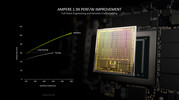NVIDIA GeForce RTX 3060 Max-Q vs NVIDIA GeForce RTX 3070 Max-Q
NVIDIA GeForce RTX 3060 Max-Q
► remove from comparison
Die Nvidia GeForce RTX 3060 Max-Q (für Laptops, GN20-E3) bezeichnet eine GeForce RTX 3060 Laptop GPU mit Max-Q Technologien. Früher waren die Max-Q-Varianten die Stromsparversionen, mit der RTX 3000 Serie kann jedoch jede TGP-Variante mit Max-Q Technologien ausgestattet werden.
NVIDIA GeForce RTX 3070 Max-Q
► remove from comparison
Die Nvidia GeForce RTX 3070 Max-Q (für Laptops, GN20-E5) bezeichnet eine GeForce RTX 3070 Laptop GPU mit Max-Q Technologien. Früher waren die Max-Q-Varianten die Stromsparversionen, mit der RTX 3000 Serie kann jedoch jede TGP-Variante mit Max-Q Technologien ausgestattet werden.
| NVIDIA GeForce RTX 3060 Max-Q | NVIDIA GeForce RTX 3070 Max-Q | |||||||||||||||||||||||||||||||||||||||||||||||||||||||||||||||||||||||||||||||||||||||||||||||||||||||||||||||||||||||||||||||
| GeForce RTX 3000 Serie |
|
| ||||||||||||||||||||||||||||||||||||||||||||||||||||||||||||||||||||||||||||||||||||||||||||||||||||||||||||||||||||||||||||||
| Codename | GN20-E3 GA106 | GN20-E5 GA104 | ||||||||||||||||||||||||||||||||||||||||||||||||||||||||||||||||||||||||||||||||||||||||||||||||||||||||||||||||||||||||||||||
| Architektur | Ampere | Ampere | ||||||||||||||||||||||||||||||||||||||||||||||||||||||||||||||||||||||||||||||||||||||||||||||||||||||||||||||||||||||||||||||
| Pipelines | 3840 - unified | 5120 - unified | ||||||||||||||||||||||||||||||||||||||||||||||||||||||||||||||||||||||||||||||||||||||||||||||||||||||||||||||||||||||||||||||
| Kerntakt | 1283 (Boost) MHz | 1290 (Boost) MHz | ||||||||||||||||||||||||||||||||||||||||||||||||||||||||||||||||||||||||||||||||||||||||||||||||||||||||||||||||||||||||||||||
| Speicherbandbreite | 192 Bit | 256 Bit | ||||||||||||||||||||||||||||||||||||||||||||||||||||||||||||||||||||||||||||||||||||||||||||||||||||||||||||||||||||||||||||||
| Speichertyp | GDDR6 | GDDR6 | ||||||||||||||||||||||||||||||||||||||||||||||||||||||||||||||||||||||||||||||||||||||||||||||||||||||||||||||||||||||||||||||
| Max. Speichergröße | 6 GB | 8 GB | ||||||||||||||||||||||||||||||||||||||||||||||||||||||||||||||||||||||||||||||||||||||||||||||||||||||||||||||||||||||||||||||
| Shared Memory | nein | nein | ||||||||||||||||||||||||||||||||||||||||||||||||||||||||||||||||||||||||||||||||||||||||||||||||||||||||||||||||||||||||||||||
| API | DirectX 12_2, Shader 6.7, OpenGL 4.6 | DirectX 12_2, Shader 6.7, OpenGL 4.6 | ||||||||||||||||||||||||||||||||||||||||||||||||||||||||||||||||||||||||||||||||||||||||||||||||||||||||||||||||||||||||||||||
| Stromverbrauch | 60 Watt | 80 Watt | ||||||||||||||||||||||||||||||||||||||||||||||||||||||||||||||||||||||||||||||||||||||||||||||||||||||||||||||||||||||||||||||
| Herstellungsprozess | 8 nm | 8 nm | ||||||||||||||||||||||||||||||||||||||||||||||||||||||||||||||||||||||||||||||||||||||||||||||||||||||||||||||||||||||||||||||
| Notebookgröße | groß (17" z.B.) | groß (17" z.B.) | ||||||||||||||||||||||||||||||||||||||||||||||||||||||||||||||||||||||||||||||||||||||||||||||||||||||||||||||||||||||||||||||
| Erscheinungsdatum | 04.01.2021 | 04.01.2021 |
Benchmarks
- Bereich der Benchmarkergebnisse für diese Grafikkarte
 - Durchschnittliche Benchmarkergebnisse für diese Grafikkarte
- Durchschnittliche Benchmarkergebnisse für diese Grafikkarte
* Smaller numbers mean a higher performance
1 This benchmark is not used for the average calculation
* Smaller numbers mean a higher performance
1 This benchmark is not used for the average calculation
Eine Liste mit weiteren Spielen und allen Grafikkarten finden Sie auf unserer Seite: Welches Spiel ist mit welcher Grafikkarte spielbar?
v1.26


 Deutsch
Deutsch English
English Español
Español Français
Français Italiano
Italiano Nederlands
Nederlands Polski
Polski Português
Português Русский
Русский Türkçe
Türkçe Svenska
Svenska Chinese
Chinese Magyar
Magyar